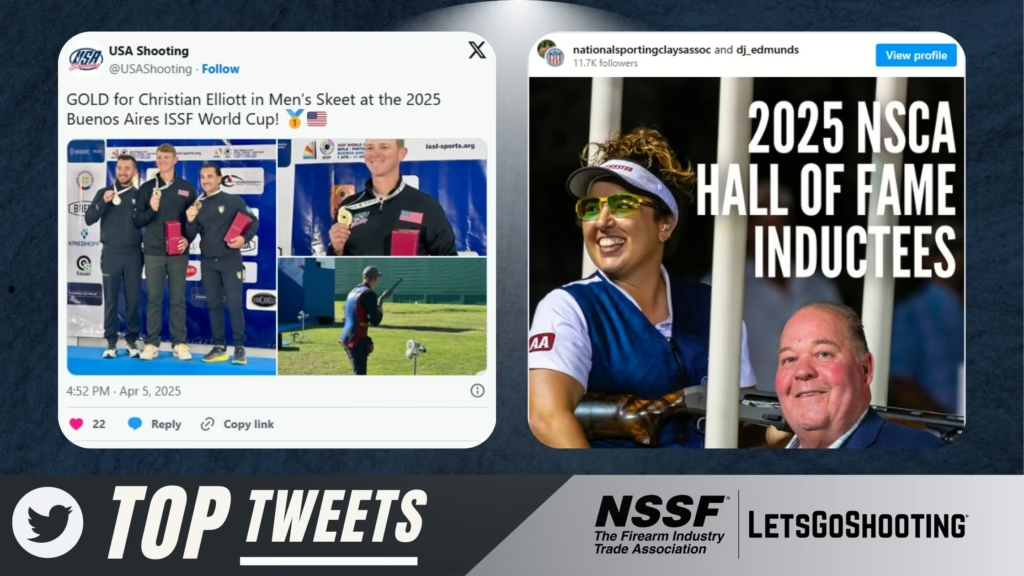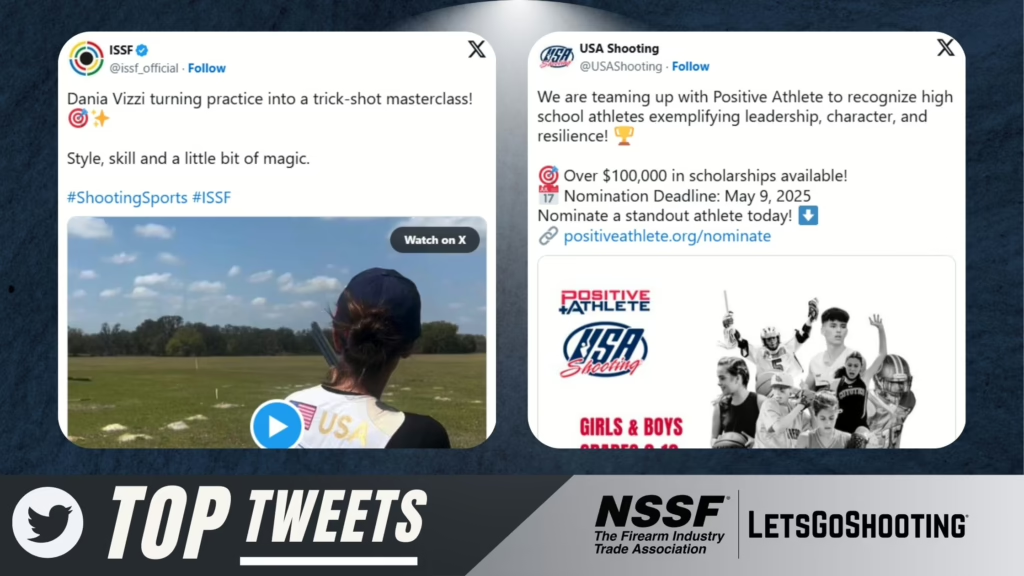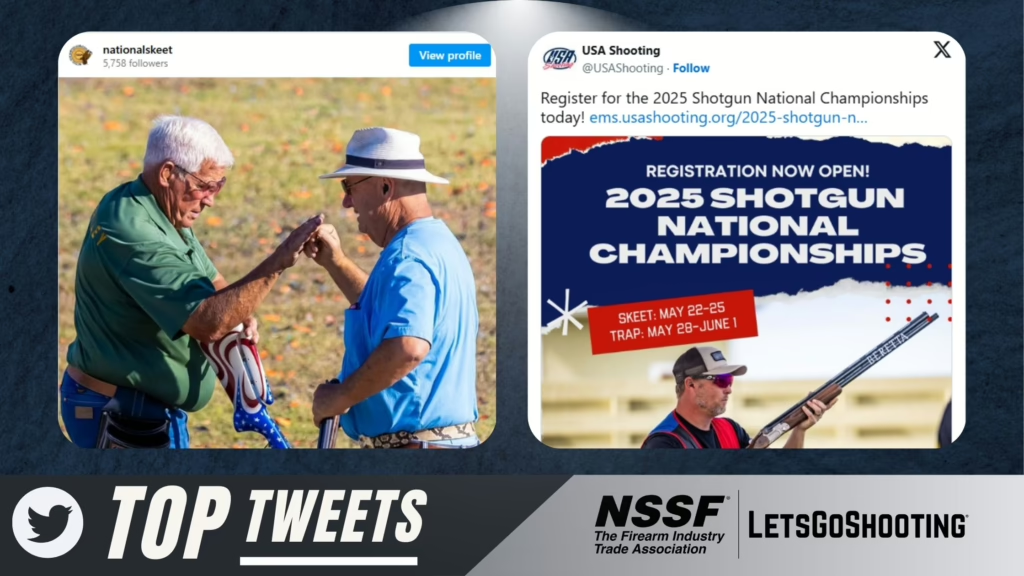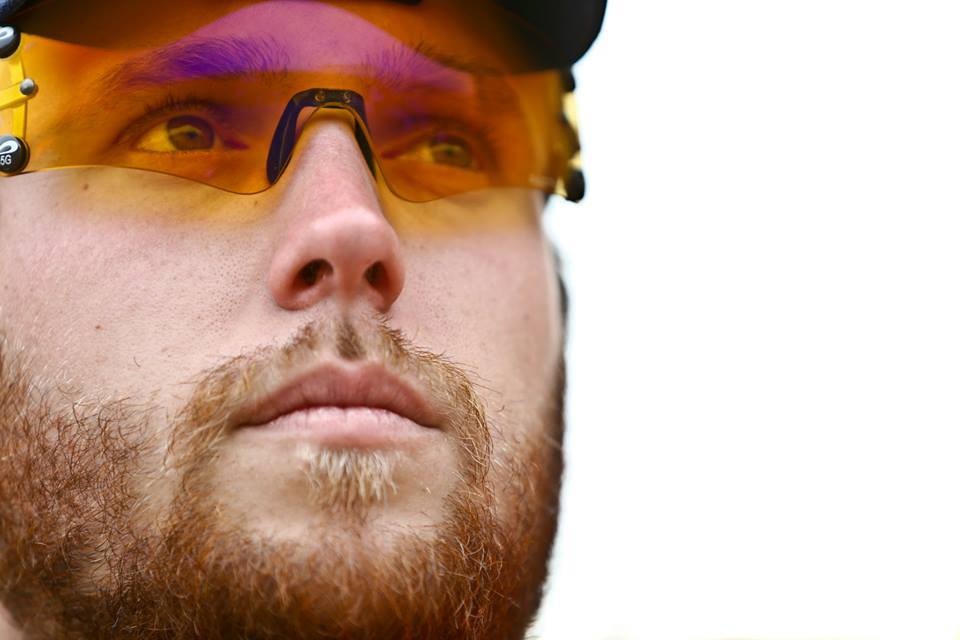
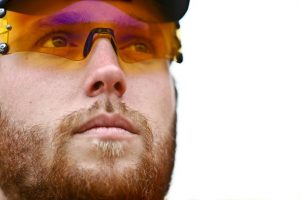 When asked the three things he’s into right now, Vincent Hancock’s reply could basically be boiled down into three distinct “F” words: faith, family and the future. That’s it. But really, each one is as paramount to his successes—of which there are many—as anything else. Without all three working in harmony together, there might be only one gold medal, not two, and for certain there would be no talk of continuing a decade-long dominance in his sport.
When asked the three things he’s into right now, Vincent Hancock’s reply could basically be boiled down into three distinct “F” words: faith, family and the future. That’s it. But really, each one is as paramount to his successes—of which there are many—as anything else. Without all three working in harmony together, there might be only one gold medal, not two, and for certain there would be no talk of continuing a decade-long dominance in his sport.
At the medalist press conference in London, following his second consecutive gold medal run in Men’s Skeet at the 2012 Summer Olympics, Hancock was already eyeing the 2016 Olympic Games in Rio: “Knowing that I want to go back and build my legacy is what I am going for now,” he said at the time. “It’s not just the number of medals. It’s what else I can do, how big can I grow this sport and how many people can I introduce to it.”
In his first big match post-London, he posted a 250-straight run during the 2013 Spring Selection Match on arguably one of the toughest ranges on the planet in Fort Benning, Georgia. To begin this season, he mastered perfection and laid down one of the best international performances ever at the season’s first World Cup in Acapulco, Mexico. It began with a perfect world-record qualifying score of 125 on his way to the unprecedented perfect match and ultimately the sixth World Cup gold medal of his career. He would remain unblemished for another 32 shots in the semis and finals.
“Vinny has more drive than most anyone I’ve ever seen,” said friend and 2012 Olympic teammate Frank Thompson. “He always has a new higher goal he wants to push to on his way to the next level, keeping him driven and working hard. I’ve learned a lot from him, whether it’s different techniques, ideas or just how to approach something. He is just as dedicated to his family as well. He’s always making sure they are included in his life and taken care of. Vinny is a great person both on and off the field and is a great icon for our sport.”
“His training ethics and natural ability have taken him to the top of the podium,” said five-time Olympic medalist Kim Rhode. “With his perfect scores, he has raised the bar for all competitors to achieve. You simply won’t find a more upstanding representative and role model for young shooters in the shooting world.”
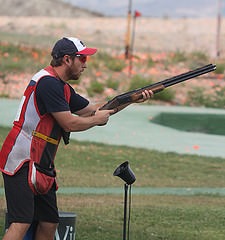 Team sports were never going to cut it for someone with as fierce a competitive drive as Vinny, who grew up in Eatonton, Georgia. There are too many people to count on to be successful. Sure, he played baseball until he was 12 years old and discovered the shooting sports, but he was always “that” kid, the one yelling and trying to do too much because his teammates wouldn’t. Through shooting and competing for Team USA, he’s found a perfect match – an individual sport within a team setting.
Team sports were never going to cut it for someone with as fierce a competitive drive as Vinny, who grew up in Eatonton, Georgia. There are too many people to count on to be successful. Sure, he played baseball until he was 12 years old and discovered the shooting sports, but he was always “that” kid, the one yelling and trying to do too much because his teammates wouldn’t. Through shooting and competing for Team USA, he’s found a perfect match – an individual sport within a team setting.
“I’m an extremely fierce competitor. I love to win. I don’t think that it’s something that gets instilled within you. It’s just something you are born with. You have to have that killer instinct. As a kid, I would do something over and over again until I could win. I’m going to do it until I get it right and I’m going to have it perfect. I’m going to be sure I’m the best at it when I’m done. I’ve put a lot of effort and a lot of time into all this and now I’m supporting a family, so that’s another motivating factor. But the will to win, the drive to win, it just comes from somewhere inside, a characteristic that’s put into you by God and you fine tune that throughout your life.”
Veering out of his Pilla shades during competition is an unmistakable fire that burns deep in his eyes. His wife describes it as Vinny’s “split personality.” Off the line, he’s as nice a person as you could ever be around. But then there’s a certain amount of beast mode that comes over him once he steps into that first station, waiting for his first low house target. His opponents see it and intimidation usually sets in.
“When you’re in the zone, it does change you completely,” admits Hancock. “The difference between myself and perhaps other competitors is that we have the expectation of greatness, while they have the dream of it. If you’re already thinking that you have to beat me, then you’ve already put enormous pressure on yourself, and not everyone can handle that. You know facing me that I’m going to step on your throat should we meet in the finals, because that’s what it’s going to take to win. You can’t be a nice guy.
“I think people misinterpret the look that I have on the range as being this cocky, arrogant person. I’m not like that off the range, but when we’re on the range I have to be that way because with that expectation comes the ability, and with that ability comes the success. They can think whatever they want when I’m on that range. I am intense and I am focused, but it’s basically to go out there and break targets. That’s it.”
Naturally, the will to win has been the biggest contributor to the success he’s found.
“If you don’t have that drive, that will to win, you’re not really going to be successful. You’ve got to truly want it. If you talk to any of the great ones like Matt [Emmons] or Kim [Rhode], we all have the same exact mentality of ‘Yeah, I’m the best and I’m going for the win, and if you want to beat me, you better bring it.’”
That will was almost stripped completely in 2011, repercussions from the grind of so much at such a young age and managing quadruple responsibilities as athlete, soldier in the U.S. Army Marksmanship Unit, father and husband. The 2012 London Oylimpics almost didn’t happen because he was ready to quit. It wasn’t fun anymore.
An introspective question, however, from his wife, Rebekah, changed everything—that and plenty of prayer. She said, “If you don’t want to do it anymore, then quit. But before you do, you should really think and pray about it and find out if that’s really what you want to do.”
That contemplation was all it took to restore the spirit, drive and competitiveness Hancock had always found in this sport. “Rebekah’s whole point about ‘If you don’t like it then quit’ wasn’t that at all, but trying to get me to see it in a different way,” Hancock states.
Though Hancock had evolved, the opinions others had did not, with many feeling that they had seen this star fizzle. Those doubters fueled him all the way to London and that’s why the London gold medal will always be the one he cherishes most.
“Basically, because it showed everyone who doubted me, who had no belief in me, that they were wrong,” asserts Hancock. “The doubters reenergized me. The first Olympic ring I got [2008], it didn’t really matter if I wore it or how I wore it, as it was something trivial. Now, with the 2012 Olympic ring, I always make it face towards me, so I can read it when I hold my hand up and I see ‘Gold Medalist’ written on it. That reminds me that this one was for me. This one wasn’t for everyone else. This one was to prove to myself that I could do it and prove everyone else wrong.”
Admittedly, Vinny has had no greater love and appreciation for this sport than he does right now, and those are two of the main ingredients fueling his desire for continued perfection at the 2016 Olympic Games in Rio de Janeiro. Now living in Fort Worth, Texas, his deepest conviction lies in both providing for his sport and his family, and he won’t be satisfied until both are well taken care of.
“I’ll be satisfied with what I achieve after, fingers crossed, I get to Rio and get a third gold medal,” Hancock says. “I’m happy with what I’ve done now, but I really feel like that I can go and win this third one and cement my place in history with the greatest of all time. I think that would be a huge platform, not just for me personally, but for the sport as a whole to show off what my sport is, who I am, what this sport has done for me and what this sport has turned me into. I’m an American boy, and this is what I do. I grew up in the South, matured in the military, and the Olympics are the greatest sporting spectacle in the world. There’s nothing better than going out there and showing off what you can do.”
On the road to Rio, he hopes he can align the sport and create the energy necessary so that the next generation after him might be able to make a living in these shooting sports similar to the way he and multi Olympic trap and skeet medalist Kim Rhode have done.
“I’m about promoting my sport like crazy,” he acknowledges. “I want these kids to actually be able to make a living coming up. If you truly love the sport, you want to do it and you want to keep doing it forever, if you possibly can. More people should have that opportunity. Should it really take the success that Kim and I have had in order to do that? I don’t think so. It’s important to me that I give back to this sport that’s given me so much.”
And as Rio comes into sight, what expectations does he have?
“I don’t expect to just be there, I expect to be on that top spot. If you don’t have that expectation going down there, then you don’t deserve to go down there.”


